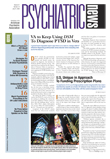DSM-IV criteria for posttraumatic stress disorder (PTSD) are well-founded and should remain the standard for diagnosis, the Institute of Medicine (IOM) reported in June. The report had been requested by the Department of Veterans affairs in response to concern about increasing numbers of veterans applying for PTSD disability compensation.
Diagnosis should be carried out by experienced clinicians familiar with DSM-IV standards, added the IOM group, chaired by Richard Mayeux, M.D., M.S., a professor of neurology, psychiatry, and epidemiology at the College of Physicians and Surgeons at Columbia University.
“The committee strongly concludes that the best way to determine whether a person is suffering from PTSD is with a thorough, face-to-face interview by a health professional trained in diagnosing psychiatric disorders,” Mayeux said.
“In asking the IOM to evaluate and confirm the DSM-IV criteria, the VA was not seeking to challenge the criteria but to provide validation of those criteria to those who did challenge them,” said Ira Katz, M.D., Ph.D., deputy chief patient care services officer for mental health at the VA. “The goals were very well met.”
Acceptance of the DSM-IV criteria meant that new, idiosyncratic standards need not be created and verified, a major concern for Darrel Regier, M.D., M.P.H., executive director of the American Psychiatric Institute for Research and Education and director of APA's Division of Research.
“Frankly, I'm surprised that things went so smoothly,” Regier told Psychiatric News. “A panel of experts agreed that the present criteria were evidence based and that there were plenty of assessment instruments to use.”
Separating diagnosis from treatment and disability was a good choice because the latter two issues probably lay more at the heart of the VA's concerns, said Regier.
The IOM committee will also review evidence for PTSD treatment and prognosis and for determining standards of disability related to the disorder. Those two reports are expected by the end of the year.
Although the primary diagnostic tool for PTSD is the knowledge and experience of the clinician, the report also suggested that use of structured or semistructured interviews such as the Clinician-Administered PTSD Scale (CAPS), the Structured Clinical Interview for DSM-IV (SCID), the PTSD Symptom Scale—Interview Version (PSS-I), can complement clinical interviews.
While some of these interviews might take time to administer, they can provide indications of presence and severity of symptoms.
Time Shouldn't Be Concern
“If you're making judgments with major treatment and compensation implications, time shouldn't be an issue,” said Regier.
Self-report instruments of war-related stress may help the clinician elicit greater detail about trauma exposure than an initial interview would, said the report, but “they should not substitute for a comprehensive diagnostic interview.”
The VA uses the same four-question screening test for PTSD as the Department of Defense. It also uses a number of other instruments to evaluate symptoms and treatment response but has no system-wide convention for choosing them.
No biomarkers currently have sufficient sensitivity and specificity to be useful for diagnosing PTSD, noted the IOM committee, in response to a question from the VA. Neuropsychiatric tests might help validate subjective reports, but they were less useful diagnostically because results might characterize other psychiatric disorders as well.
The IOM also noted that PTSD was a true disorder because it met standards for validity, having distinct clinical features that had been consistently documented in a variety of settings and cultures, longitudinal stability, and some evidence that genetic factors accounted for about one-third of PTSD symptoms.
Disability Claims Questioned
At committee hearings in February, several speakers suggested that many veterans applying for disability compensation for PTSD through the VA were not suffering from the disorder, but looking for a government pension. clinicians should be aware of the potential for malingering and should consider discrepancies in the patient's reports, lack of cooperation in evaluation or treatment, and evidence of antisocial personality disorder in their evaluation, said the committee, echoing APA recommendations.
“Part of the reason for asking that clinically well-trained people evaluate patients is to avoid overdiagnosing people faking PTSD,” said Regier. Several psychometric tests, like the MMPI-2 or the Impact of Event Scale–Revised, do a good job of detecting fakery, he added. Other speakers at the February hearings presented evidence that there were few instances of malingering among Vietnam War veterans studied. although the impetus for the IOM report arose from concern about veterans of earlier wars, Katz said that about 30 percent of returning veterans of Iraq and Afghanistan come to the VA for medical care. Of those, 33 percent have mental health concerns, and 15 percent of that group have at least some symptoms of PTSD.
Nothing specific in the report should cause the VA to change its approach to diagnosing PTSD, but the department is continually seeking to improve its services, said Katz. “The issue isn't business as usual, but enhancement as usual,” he said. “The VA views the best diagnosis as an evolving process, guided by empirical-research evidence and accumulating evidence.”
The IOM report also did not presage any developments for PTSD criteria that might appear in DSM-V, said Regier. Research over the next several years may generate new information that could confirm present standards or guide new ones, he said.
“Posttraumatic Stress Disorder: Diagnosis and Assessment” is posted at<www.nap.edu/catalog/11674.html#toc>.▪
